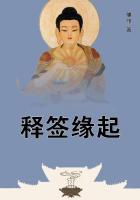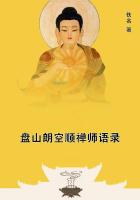To be dead to the Law means to be free of the Law. What right, then, has the Law to accuse me, or to hold anything against me? When you see a person squirming in the clutches of the Law, say to him: "Brother, get things straight. You let the Law talk to your conscience. Make it talk to your flesh. Wake up, and believe in Jesus Christ, the Conqueror of Law and sin. Faith in Christ will lift you high above the Law into the heaven of grace. Though Law and sin remain, they no longer concern you, because you are dead to the Law and dead to sin."
Blessed is the person who knows how to use this truth in times of distress.
He can talk. He can say: "Mr. Law, go ahead and accuse me as much as you like. I know I have committed many sins, and I continue to sin daily. But that does not bother me. You have got to shout louder, Mr. Law. I am deaf, you know. Talk as much as you like, I am dead to you. If you want to talk to me about my sins, go and talk to my flesh. Belabor that, but don't talk to my conscience. My conscience is a lady and a queen, and has nothing to do with the likes of you, because my conscience lives to Christ under another law, a new and better law, the law of grace."
We have two propositions: To live unto the Law, is to die unto God. To die unto the Law, is to live unto God. These two propositions go against reason. No law-worker can ever understand them. But see to it that you understand them. The Law can never justify and save a sinner. The Law can only accuse, terrify, and kill him. Therefore to live unto the Law is to die unto God. Vice versa, to die unto the Law is to live unto God. If you want to live unto God, bury the Law, and find life through faith in Christ Jesus.
We have enough arguments right here to conclude that justification is by faith alone. How can the Law effect our justification, when Paul so plainly states that we must be dead to the Law if we want to live unto God? If we are dead to the Law and the Law is dead to us, how can it possibly contribute anything to our justification? There is nothing left for us but to be justified by faith alone.
This nineteenth verse is loaded with consolation. It fortifies a person against every danger. It allows you to argue like this:
"I confess I have sinned."
"Then God will punish you."
"No, He will not do that."
"Why not? Does not the Law say so?"
"I have nothing to do with the Law."
"How so?"
"I have another law, the law of liberty."
"What do you mean--'liberty'?"
"The liberty of Christ, for Christ has made me free from the Law that held me down. That Law is now in prison itself, held captive by grace and liberty."
By faith in Christ a person may gain such sure and sound comfort, that he need not fear the devil, sin, death, or any evil. "Sir Devil," he may say, "I am not afraid of you. I have a Friend whose name is Jesus Christ, in whom I believe. He has abolished the Law, condemned sin, vanquished death, and destroyed hell for me. He is bigger than you, Satan. He has licked you, and holds you down. You cannot hurt me." This is the faith that overcomes the devil.
Paul manhandles the Law. He treats the Law as if it were a thief and a robber He treats the Law as contemptible to the conscience, in order that those who believe in Christ may take courage to defy the Law, and say:
"Mr. Law, I am a sinner. What are you going to do about it?"
Or take death. Christ is risen from death. Why should we now fear the grave? Against my death I set another death, or rather life, my life in Christ.
Oh, the sweet names of Jesus! He is called my law against the Law, my sin against sin, my death against death. Translated, it means that He is my righteousness, my life, my everlasting salvation. For this reason was He made the law of the Law, the sin of sin, the death of death, that He might redeem me from the curse of the Law. He permitted the Law to accuse Him, sin to condemn Him, and death to take Him, to abolish the Law, to condemn sin, and to destroy death for me.
This peculiar form of speech sounds much sweeter than if Paul had said:
"I through liberty am dead to the law." By putting it in this way, "I through the law am dead to the law," he opposes one law with another law, and has them fight it out.
In this masterly fashion Paul draws our attention away from the Law, sin, death, and every evil, and centers it upon Christ.
VERSE 20. I am crucified with Christ.
Christ is Lord over the Law, because He was crucified unto the Law. I also am lord over the Law, because by faith I am crucified with Christ.
Paul does not here speak of crucifying the flesh, but he speaks of that higher crucifying wherein sin, devil, and death are crucified in Christ and in me. By my faith in Christ I am crucified with Christ. Hence these evils are crucified and dead unto me.
VERSE 20. Nevertheless I live.
"I do not mean to create the impression as though I did not live before this. But in reality I first live now, now that I have been delivered from the Law, from sin, and death. Being crucified with Christ and dead unto the Law, I may now rise unto a new and better life."
We must pay close attention to Paul's way of speaking. He says that we are crucified and dead unto the Law. The fact is, the Law is crucified and dead unto us. Paul purposely speaks that way in order to increase the portion of our comfort.
VERSE 20. Yet not I.
Paul explains what constitutes true Christian righteousness. True Christian righteousness is the righteousness of Christ who lives in us. We must look away from our own person. Christ and my conscience must become one, so that I can see nothing else but Christ crucified and raised from the dead for me. If I keep on looking at myself, I am gone.
If we lose sight of Christ and begin to consider our past, we simply go to pieces. We must turn our eyes to the brazen serpent, Christ crucified, and believe with all our heart that He is our righteousness and our life. For Christ, on whom our eyes are fixed, in whom we live, who lives in us, is Lord over Law, sin, death, and all evil.
VERSE 20. But Christ liveth in me.















